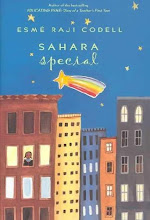"How old are you?" asked Sakiah.
"In human years, or teacher years?" Miss Pointy answered, and then quickly called on someone else.
- from Sahara Special
You did it! Or you are about to do it. Maybe you finished your first year of teaching. Maybe you graduated and about to embark on your classroom--or job search--adventure. Congratulations! Whatever the case, we are older and wiser, or at least older. I think back to when I was starting out. So many fellow students complaining about the content of our education classes, "how is this useful?" So many new teachers marveling in the classroom, "they never told me it would be like this." There was an interesting Op-Ed in the New York Times recently about the dangers of assessing teacher performance through student evaluation. New teachers have a unique perspective, I think, recently having been students but having a special empathy for the educator's role. After your experience and the chance to gain some perspective, what turned out to be more valuable in your preparation than you ever expected? What do you wish someone would have told you?
I know there were many things I didn't fully appreciate until I got into the classroom, such as the value of theory in the context of classroom management, the power of keeping a journal as a way to reflect on practice, the generosity of mentors and teaching veterans, and how important it is to keep loose change in the desk drawer in case kids come up short for lunch money. But here's what I was most glad to learn and know: If you want kids to respect you and pay attention, you don't have to be nice all the time, but you do have to be interesting. You have to have something that they want: knowledge, ability, elegance. Sure, candy in a drawer is nice, too, but they get their fill of that a lot faster.
I know there were many things I didn't fully appreciate until I got into the classroom, such as the value of theory in the context of classroom management, the power of keeping a journal as a way to reflect on practice, the generosity of mentors and teaching veterans, and how important it is to keep loose change in the desk drawer in case kids come up short for lunch money. But here's what I was most glad to learn and know: If you want kids to respect you and pay attention, you don't have to be nice all the time, but you do have to be interesting. You have to have something that they want: knowledge, ability, elegance. Sure, candy in a drawer is nice, too, but they get their fill of that a lot faster.
But not everybody can work in a bookstore. Children's li
 terature courses are largely undervalued in too many teacher preparatory programs. And with scripted curriculum, standardized testing, corporate influence and mandates that require robotic everybody-do-everything-at-the-same-time malarky, it almost seems like a moot point to learn what to bring in from the world, because there never seems like there will be time in the day to share. But this summer, read all you can from the shelves of children's literature anyway. Universities will never supply you with enough knock-knock jokes, spooky stories or science experiments to do the damn job right. Hold tight to the dream that the day will dawn again when teachers (and students!) can give the best of themselves and what they know about the world in their classrooms, because one of two things are bound to happen: either that day will dawn, or people who are truly accountable, not to scores but to children, will reinvent contexts that will allow it to be. What an exciting time!
terature courses are largely undervalued in too many teacher preparatory programs. And with scripted curriculum, standardized testing, corporate influence and mandates that require robotic everybody-do-everything-at-the-same-time malarky, it almost seems like a moot point to learn what to bring in from the world, because there never seems like there will be time in the day to share. But this summer, read all you can from the shelves of children's literature anyway. Universities will never supply you with enough knock-knock jokes, spooky stories or science experiments to do the damn job right. Hold tight to the dream that the day will dawn again when teachers (and students!) can give the best of themselves and what they know about the world in their classrooms, because one of two things are bound to happen: either that day will dawn, or people who are truly accountable, not to scores but to children, will reinvent contexts that will allow it to be. What an exciting time!
As a teacher, what did you learn this year? As you relax on the beach with a slushy beverage that contains a paper umbrella, please take a moment to enlighten, celebrate or vent in the comment section below; one reachable person will be chosen at random at the end of the month to receive a copy of one of my favorite books, ARTIST TO ARTIST from the Eric Carle Museum of Picture Book Art.
from the Eric Carle Museum of Picture Book Art. 








